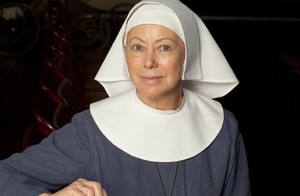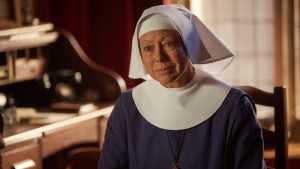CALL THE MIDWIFE has just begun airing its tenth season in the U.S. Sundays on PBS (check local listings for exact airtimes), with the previous nine seasons currently available on Netflix. The series runs on the BBC in England.
Based on the memoirs of real-life midwife Jennifer Worth and adapted for British television by Heidi Thomas, CALL THE MIDWIFE is set at Nonnatus House, a residence for Anglican nuns and lay practitioners who work as midwives in London’s East End. Each season takes place in a new year. Season 10 begins in 1966, when Nonnatus House is facing funding troubles, and the British government is considering legalizing abortion.
Jenny Agutter has played Sister Julienne, currently in charge at Nonnatus House, since the beginning of CALL THE MIDWIFE. Born in Somerset, England, Agutter began acting as a child, appearing in the classic TV series THE RAILWAY CHILDREN and its subsequent film adaptation. Agutter won an Emmy for her performance in the telefilm THE SNOW GOOSE.
Some of Agutter’s film work includes WALKABOUT, LOGAN’S RUN, AN AMERICAN WEREWOLF IN LONDON, THE AVENGERS, and SOMETIMES ALWAYS NEVER.
In the first part of our exclusive interview, Agutter, speaking by phone from her home in London, discusses the start of her work on CALL THE MIDWIFE.
ASSIGNMENT X: At the start of CALL THE MIDWIFE, if somebody had said to you, “This is going to go for ten seasons,” would you have gone, “Oh, good” or, “Oh, no”?
JENNY AGUTTER: I’d have said, “You’re joking.” I couldn’t ever foresee it going on to the length of time it has. I didn’t really think about it going for a season beyond what we were doing. There were six episodes at the beginning. There was no Christmas special. They were beautifully put together, the scripts were very good, I knew there were good people involved, a lovely cast, and I was thrilled to do it. But it didn’t occur to me at all that it would have longevity.
When it showed, it immediately picked up a big audience. And immediately, the BBC talked about another year. I suppose I should have seen [it coming]. For one thing, Jennifer Worth’s memoirs had been very popular, certainly here in the U.K. And then of course, [there isn’t just one] focus. Babies are very important. The midwife, of course, is essential to it. But they’re involved with the community, and what’s happening in the community that makes it so attractive to a very diverse group of people.
I’m fascinated by the fact that men, women, all ages, all economic backgrounds, all different ethnic backgrounds, seem to enjoy it and find something to focus on in it. I’m often stopped by people on the street who want to talk about it. Not about me, not about me being an actor, but about the program and about how it’s affected them, and how it might have been a part of their lives – they have an aunt who’s a midwife, or they remember something, or they come from the East End. Whatever it is, or even if it’s something completely outside of their experience, [there is a fascination with the subject matter], and the community, and I think that that’s what made it so successful.
AX: Well, there does seem to be a fascination with London’s East End. EASTENDERS has been on in England for thirty-seven years and is still running. There’s also a fascination with medical dramas; CASUALTY has been running in England since 1986, and that’s also still on. So, maybe CALL THE MIDWIFE lands somewhere between those two, skewing more female, with a religious aspect as well?
AGUTTER: [laughs] When Jennifer Worth wrote the memoirs, she was prompted to do it by Terri Coates, who was a midwife, who works with us [as an advisor on the series] There are lots of doctor stories, lots of hospital stories, but no one had ever focused on midwives [prior to CALL THE MIDWIFE]. That’s so much a part of women’s lives, and community, with midwifery as it was, when we started, very particularly, the midwife going to people’s homes, it was something that was really missing [in literature and drama]. But yes, it does have that element. There is the medical side, and then there’s the social side.
I think EASTENDERS is [popular], because you can see much more close-knit communities that don’t change as much. If you’re in London, there are areas of London which just keep changing all the time. Actually, where I live, in Camberwell, is an area that people don’t move around much. If you’re in Chelsea, they move all the time. You want to focus on an area where people don’t keep selling their houses and moving on. Changes in the community come because of things like Windrush, with people coming over from the Caribbean, and different elements of what was the British Empire, and communities of India, and Pakistan, all of those people coming in newly and enriching the community.
AX: Is Sister Julienne the first time you’ve played a nun?
AGUTTER: Yes, it is.
AX: Did you do any research back at the beginning into the difference between Catholic nuns and Anglican nuns?
AGUTTER: I was very aware from the beginning of the difference between Catholic nuns and Anglican nuns. I was brought up Catholic. Not strictly, but my mother was Catholic, so I was very aware of Catholics and Catholic nuns, and I’m aware of the Anglicans and what they do. And I think that the interest for me was the Anglican nuns, and their commitment and the Nonnatus nuns’ commitment to community service. We did also a great deal of research at the beginning. Philippa [Lowthorpe], our director, advised with a lot of information about the East End, about the nuns, about the background of the nuns.
Sister Jocelyn, as she was called, was the person Julienne was based on. I had photographs of her, and it happened, just by coincidence, that I met a young woman who knew the niece of Sister Jocelyn. And she said would I would like to meet, and I did. She was wonderful, and she wrote out notes for me about her aunt, and the way she was. It was great. Although one can’t replicate the character, it was lovely to know that she wanted to honor that, and I took many of these aspects of the way that she seemed to be, because in truth, being a nun is completely outside anything I could imagine for myself [laughs]. So, one hangs onto anything that is real, that one knows.
AX: Vanessa Redgrave narrates CALL THE MIDWFIE. Is Laura Main’s character, Shelagh Turner, who’s married to Stephen McGann’s primary doctor character Patrick Turner, meant to be the onscreen version of the narrator?
AGUTTER: No. Vanessa Redgrave’s voice is very much Jennifer Worth’s. [The young version of Worth was an onscreen character, played by Jessica Raine] at the beginning. It’s an interesting idea. I hadn’t really thought about that. Because Shelagh had been a nun, and then she steps out as a midwife, and she’s very much involved in many of the stories through Dr. Turner.
But no. It was Jennifer, the character, in the beginning, who was Jennifer Worth. And then it’s carried on with her voice as a memoir, as a remembered voice of what it was like, and her views and little words of wisdom that come in. And it’s her voice that gives you a sense of what each episode that we do might be about, because they often have a very particular theme. We’ll have about three stories interwoven, but there will be a particular theme that it might be dealing with, whether it’s the relationship between parents and children, or mother and child, or a relationship with the difficulties that people are going through. It’ll take something particular, and she’ll talk at the beginning and the end about those ideas.
AX: Is it strenuous playing somebody who is as much a font of moral rectitude as Sister Julienne? She does have doubt, but she doesn’t seem to have moral doubt …
AGUTTER: [laughs] Yes, it’s very difficult. You’re right. She lives with a lot of doubt, I think, particularly as the years go by. The more choices there are for people, the more difficult she sees it being for people around her. Her own strength, her own faith, I think, may be questioned a couple of times, only because of the difficulties of the circumstances.
I remember one year, we did [a storyline] which was dealing with abuse within a family, and it was completely hidden, and the revelation of that was a lot to deal with. It’s very hard to understand how something like that happens. And I think for Sister Julienne, it was very hard for her to realize how that happened. What she has no problem with is what people generally do. She just deals with circumstances. And I think that’s her strength, is just getting on with it.
It’s so very different from myself, because if I think something’s wrong, I want to immediately do something about it, I want to change things, and so I’m very immediate in my reactions. And she’s not. She cares for people, and I think that’s an extraordinary thing.
The other thing that made me understand a little bit more about her faith was that Heidi Thomas gave a back story to Sister Julienne, in Season 5, I think. It showed there was a relationship, and you realized that there had been a man in her life before she became a nun, and that it was a very important relationship, and one that was very close, and could easily have been a marriage. And it wasn’t that something went wrong, but she chose to go to become a nun, because she felt so committed to that way of life. And that is something that I always hang onto, because I know that someone with that kind of commitment isn’t likely to be looking for something else. That is absolute for her.
Follow us on Twitter at ASSIGNMENT X
Like us on Facebook at ASSIGNMENT X
Article Source: Assignment X
Article: CALL THE MIDWIFE: Actress Jenny Agutter on new season – Exclusive Interview
Related Posts:














